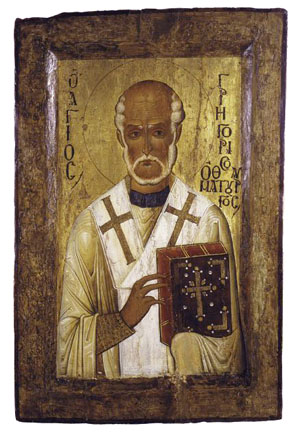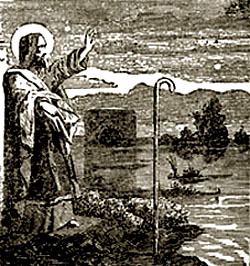 |
The Saint of the Day
St. Gregory Thaumaturgus – November 17
Prof. Plinio Corrêa de Oliveira
Biographical selection:
Gregory was born to a distinguished pagan family in Neoceasarea in 213. He became a disciple of Origin, and afterward was appointed Bishop of Neoceasarea. Illustrious for his doctrine and sanctity, he was still more memorable for the number and brilliance of miracles he worked, which earned for him the title Thaumaturgus – Miracle Worker – and made him comparable to Moses, the Prophets and the Apostles, according to the testimony of St. Basil.

St. Gregory Thaumaturgus |
Through his prayer, he moved a mountain that prevented the construction of a church. He dried a lake that was the cause of dissension between two brothers. He stopped the flooding of the Icus River that was devastating the fields by planting his staff along the border of the river. His staff took root, and was transformed into a great tree beyond whose limits the water would not pass.
Many times he expelled devils from the idols and the bodies of possessed persons. These are some of the many miracles he worked, which caused multitudes to enter the Catholic Faith. He also had the spirit of the Prophets, foretelling many future events.
On his deathbed he was informed that the number of heretics in Neoceasarea was only seventeen. He gave thanks to God, because he had found but seventeen Catholics in the diocese when he became Bishop.
He was a noted theological writer, and wrote several works which, like his miracles, illustrated the teachings of the Church of God. He died between 270 and 275.
Comments of Prof. Plinio:
God grants the gift of miracles to many of His saints. It is a way God chooses to prove that the Catholic Church is divine. It is also a means to show the whole Church how He is united with a particular saint, and that He wants to be particularly glorified through him. But very rarely does He grant to a single person the capacity to work one miracle after another, each one more extraordinary than the other. This is what He did with St. Gregory Thaumaturgus.
An interesting thing about the miracles St. Gregory worked is that they are not open to discussion or contestation. An atheist or any other enemy of the Church can revolt against a miracle of Lourdes and assert that the person was cured by self-suggestion. But no one, except a crazy man, can say that a mountain moved from one place to another due to the self-suggestion of the onlookers, or that a lake dried up overnight for the same reason. If it were a phenomenon of self-suggestion, after some time everyone would realize that the mountain was still in its original place and the lake filled with water.

The miracle of St. Gregory and his staff |
The same can be said about the staff he planted on the river bank, which took root and became a large tree. If this were a phenomenon of self-suggestion, the tree would not have stood there in open sight of every traveler for a long period of time; there would have been just the staff. Self-suggestion is impossible in such a case. The miracles worked by St. Gregory Thaumaturgus were absolutely undisputable.
As we just pointed out, the working of miracles, especially extraordinary miracles like those worked by St. Gregory, is a means Divine Providence has to show the world that the Catholic Church is divine. But his miracles also have other implications.
We see that there was a practical reason for St. Gregory Thaumaturgus to move the mountain from its original site. It was preventing the construction of a church. He worked this grand miracle to resolve a rather unimportant problem. I know that it is important to build a church, but it could be constructed at the top the mountain or in another place. There is no reason to believe that this particular site was the only place the church could be built.
But Divine Providence wanted him to ask for an extraordinary miracle in order to show how paternal God is, how good and accessible Divine Providence is to those who are faithful. Miracles are not only worked on occasions of great anguish, in face of imminent tragedies. God is a Father, Our Lady is a Mother. They give us graces, even the greatest ones, just for our convenience, with a magnificent liberality.
The Book of Confidence insists strongly on this point: we need to ask for everything, to ask insistently, and to ask with the certainty that our requests will be granted. We should ask even for the very simple things we need. Because of the familial relationship we have with Our Lady and Our Lord, we should be sure that these things will be given. Here we see an astonishing miracle – the moving of a mountain – granted by God just to make the life of the saint easier, so that his desire to build a church on that site could be conveniently executed.
Another miracle mentioned in the excerpt was that of the lake. Two brothers were quarrelling over its waters; he caused the lake to dry up. He gave a spectacular lesson to these brothers. He sent the message: “You are fighting over the property rights of the water of this lake. Well, there is no longer any water to quarrel over, so let your dispute end.” We see that there was a reason for this great miracle, but it was a trifling reason, just a family quarrel like so many others that we hear about everyday. Perhaps if he would have spoken sternly to the brothers, he would have convinced them of their bad behavior. There was nothing catastrophic in the dissension. Notwithstanding, God heard his prayer and resolved that simple quarrel in a marvelous way.

St. Gregory the Wonderworker |
The third miracle involved the flooding of a river in Neoceasarea. In certain areas man has always had to live with floods, and most probably his city had experienced many such floods before and survived them without so many problems. Again, God made an extraordinary miracle to show that He hears not only the prayers of those in despair; He is also pleased to grant us graces for our day-to-day life. He is pleased to attend to the normal needs of our lives.
If God worked such astonishing miracles through St. Gregory in order to resolve small problems, how much more pleased would He be to assist us in the spiritual necessities of our lives? How many mountains of bad habits do we have to be removed from our souls? How many lakes of self-love to be dried up? How many floods of worldly attachments to be stopped? We should direct ourselves to Our Lord through Our Lady asking these favors with filial confidence.
Hearing this, some of us might become discouraged and say: “Yes, St. Gregory achieved these results because he was a saint. But I am nothing but a sinner and a broken man. If I were to ask for such great things, I would reach nothing.”
I respond to this objection saying: St. Gregory Thaumaturgus is in Heaven, ready to attend to our prayers. If he resolved the small problems of his relatives and friends with astonishing miracles, he can likewise help us, who have major problems. Most probably he will resolve our troubles with even greater miracles. Today on his feast day, we should ask him for all the graces we need.
Finally, it is worth noting that he had a special power to expel devils. He expelled devils from the idols and from persons who were possessed.
In this we find an indirect affirmation that behind the idol is a devil. It is an affirmation that is not at all ecumenical. Today we hear it said that all religions are good, and therefore, there are no devils in the idols worshipped by the false religions. However, the constant teaching of the Church has always taught us the opposite. There are devils in the false religions, as well as in their temples. Protestant temples, Muslim mosques, Jewish synagogues, Schismatic churches - all of them are infested with devils. We should avoid any proximity with such places, and when we have to pass by them on foot or in a vehicle, we should make an ejaculation to our Guardian Angel to protect us from those evil spirits, errors, and heresies.
St. Gregory was an anti-ecumenical saint. On his death bed, when someone told him there were only 17 heretics in his diocese, he was exultant, because when he first became the Bishop of Neoceasarea, there were only 17 Catholics. He had completely reversed the situation. It was his way to say to God: “I have fulfilled my mission.”
There was nothing left for him to do but deliver his saintly, innocent soul into the hands of the Creator.


  | | Prof. Plinio Corrêa de Oliveira | |
The Saint of the Day features highlights from the lives of saints based on comments made by the late Prof. Plinio Corrêa de Oliveira. Following the example of St. John Bosco who used to make similar talks for the boys of his College, each evening it was Prof. Plinio’s custom to make a short commentary on the lives of the next day’s saint in a meeting for youth in order to encourage them in the practice of virtue and love for the Catholic Church. TIA thought that its readers could profit from these valuable commentaries.
The texts of both the biographical data and the comments come from personal notes taken by Atila S. Guimarães from 1964 to 1995. Given the fact that the source is a personal notebook, it is possible that at times the biographic notes transcribed here will not rigorously follow the original text read by Prof. Plinio. The commentaries have also been adapted and translated for TIA’s site.
|
Saint of the Day | Home | Books | CDs | Search | Contact Us | Donate

© 2002- Tradition in Action, Inc. All Rights Reserved
|
 |

|